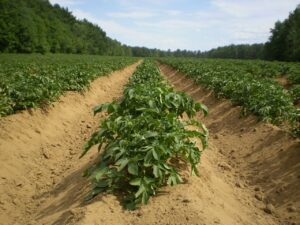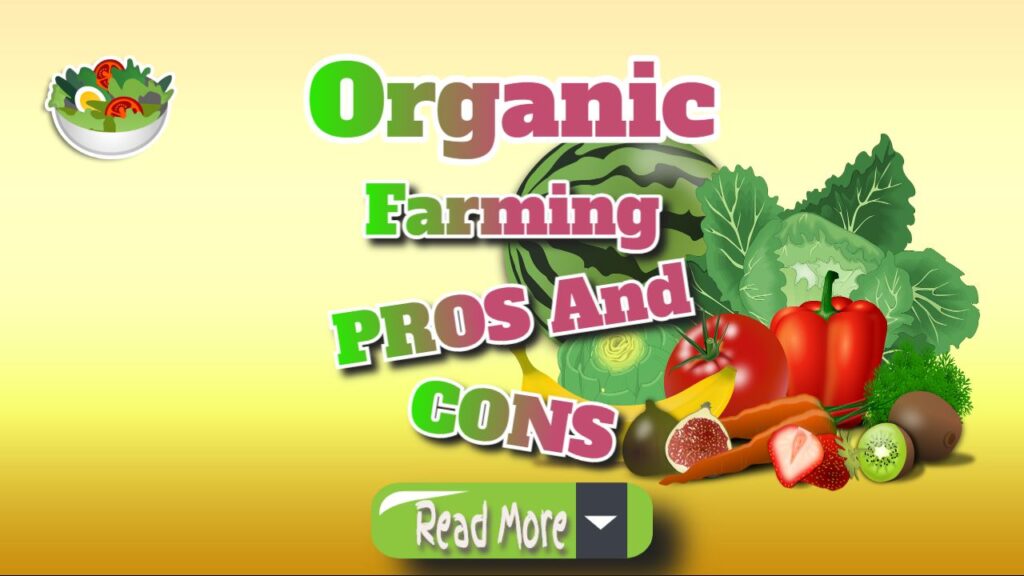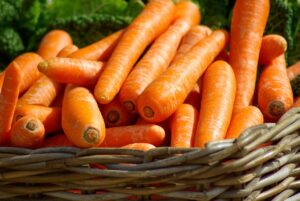Explore Our In-Depth Guide to Organic Farming
- Grasp the Fundamental Principles of Organic Farming
- Uncover the Benefits of Organic Farming
- Evaluate the Drawbacks of Organic Farming
- Discover the Essential Features and Importance of Organic Farming
- Clarify Organic Farming: Key Features, Advantages, and Core Principles
- Understand How Supporting Organic Farming Benefits Your Health and the Planet
- Learn the Soil Association’s Definition of Organic Farming
- See How Simone Thomas Wellness Promotes Organic Farming
- Improve Soil Conservation and Management with Organic Practices
- Dive Into Recent Research on Organic Farming’s Environmental Effects
- Analyze the Financial Aspects of Organic Products
- Thorough Examination of the Advantages and Disadvantages of Organic Farming
Grasp the Fundamental Principles of Organic Farming
Organic farming represents a holistic approach to agriculture that prioritizes natural methods for the cultivation of crops, livestock rearing, and poultry production. This sustainable farming system utilizes a variety of techniques like green manure, composting, biological pest control, and crop rotation to boost productivity while simultaneously protecting the environment. By enhancing the natural cycling of resources, organic farming is instrumental in maintaining biodiversity and fostering an ecological balance, which is crucial for sustainable food production. Among its key practices are the use of cover crops, the application of animal manure, and the rotation of crops to disrupt the cycles of pests and diseases, thus enhancing soil fertility and maximizing biological activity within the soil. This creates a resilient ecosystem that supports healthy agricultural practices.
The essence of organic farming is its commitment to managing ecosystems in a manner that enriches soil health while reducing reliance on synthetic inputs. This philosophy incorporates the art and science of plant breeding to boost resilience without genetic modification, emphasizes careful pest management that avoids synthetic pesticides, and advocates for the use of natural fertilizers instead of chemical alternatives. Innovative practices endorsed by organic farming advocates, such as the no-till movement, showcase the accessibility and effectiveness of these methods for both gardeners and farmers, leading to environmental and economic benefits without necessitating expensive machinery or tools.
The surge in organic farming can be traced back to mounting concerns regarding pesticide residues and the potential risks associated with genetically modified organisms (GMOs). The sophisticated marketing strategies utilized by advocates of organic farming have significantly shaped consumer behavior, prompting many farmers to transition to organic methodologies in their pursuit of increased profitability. However, this transition has also opened the door to cases of fraudulent labeling, where conventional farmers misrepresent their products as organic. The ongoing challenge lies in developing trustworthy testing methods to differentiate between organically cultivated crops and those treated with synthetic fertilizers, particularly since the biological characteristics of these plants may not vary significantly.
Uncover the Benefits of Organic Farming
As the global population is anticipated to increase by billions in the coming century, the pressing challenge of sustainably feeding this burgeoning number is coming to the forefront. Current agricultural practices, particularly those rooted in conventional industrial methods, are placing immense strain on our planet’s limited land resources, which are increasingly being degraded by extensive farming practices. A report by National Geographic News highlights that food production currently occupies nearly half of the Earth’s land area, posing a significant threat to the remaining fertile zones. To effectively tackle this critical issue, it is vital to conduct a thorough assessment of the strengths and weaknesses inherent in both modern industrial agriculture and organic farming.
A fundamental tenet of organic farming is the outright prohibition of synthetic chemical fertilizers, antibiotics, herbicides, and pesticides. The primary objective of organic practices is to produce agricultural outputs—including fibers, grains, vegetables, fruits, and livestock—using the most natural and sustainable methods available. Organic farming excels at protecting our water and soil resources, maintaining ecological balance, and efficiently utilizing renewable resources. However, it is equally important to acknowledge the potential downsides associated with these practices. Below, we will explore the various advantages and disadvantages tied to organic farming, offering a comprehensive perspective on this essential agricultural methodology.
As your curiosity about organic farming deepens, you may find yourself contemplating its significance and future implications. The rapid increase in the global population necessitates a transition from conventional farming methods, which heavily depend on chemical inputs, toward more sustainable practices. The harmful effects of chemical fertilizers and pesticides on our soil, air, and water quality underscore the urgent need for organic farming practices that emphasize ecological health and the generation of non-toxic food options.
Despite accounting for merely 1% of the world’s agricultural land, organic farming represents a significant opportunity to tackle one of humanity’s greatest challenges: producing enough food for an estimated population of 10 billion by 2050 without incurring extensive deforestation or environmental degradation. This assertion is reinforced by a study conducted by my PhD student, Jonathan Wachter, which analyzed a wealth of scientific studies comparing the long-term sustainability of both organic and conventional agriculture. The published research, titled “Organic agriculture in the 21st century,” employed the four primary sustainability criteria established by the National Academy of Sciences: productivity, economic viability, environmental soundness, and social justice.
Evaluate the Drawbacks of Organic Farming
While organic farming offers a plethora of advantages, it is not without its set of limitations. Research by CNN reveals that organic crop yields may be considerably lower—by as much as 25%—compared to those produced through conventional farming methods. This variance in yield can be attributed to several factors, including seasonal variations and the types of crops being cultivated. However, the inherent challenges associated with organic farming can often lead to slower growth rates. Additionally, the techniques utilized in organic farming frequently result in higher prices for consumers than those associated with conventionally grown food items.
The rising consumer demand for organic products has significantly altered the market landscape. Once regarded as a niche for environmentally conscious or affluent individuals, organic food has achieved widespread acceptance across a diverse array of demographics. Organic farming practices, which deliberately avoid the use of synthetic fertilizers and pesticides, favor more traditional methods of pest and nutrient management—such as crop rotation, natural barriers, and ecological pest control strategies.
Over the past two decades, the organic agriculture sector has witnessed remarkable growth, with organic food and beverage sales skyrocketing from $1 billion in 1990 to an astonishing $26.7 billion by 2010. This growth trajectory has been propelled by average annual increases ranging from 12% to 21% (OTA, 2011). Notably, in 2005, all 50 states in the U.S. reported the presence of certified organic farms, encompassing over 4 million acres (USDA-ers, 2008). With nearly 70% of American consumers now purchasing organic products (Hartman Group, 2008), many organic farmers are struggling to keep pace with the rapid expansion of their market, creating a gap between supply and demand.
The increasing population in regions such as Florida is leading to development pressures that adversely affect natural resources and contribute to environmental degradation. Adopting organic agriculture can help alleviate some of this environmental burden by promoting natural food production practices. By minimizing the use of pesticides and herbicides, organic farming encourages diverse ecosystems that encompass a variety of plants, insects, and wildlife (McIlwain 2004). Furthermore, organic practices are typically less energy-intensive and generate minimal waste when compared to conventional farming techniques. A study conducted by Washington State University indicated that cultivating organic apples is approximately 7% more energy-efficient than conventional apple farming (McIlwain 2004).
Discover the Essential Features and Importance of Organic Farming
Organic farming is distinguished by its unwavering commitment to soil health and sustainability, ensuring that agricultural practices do not lead to land degradation or contribute to desertification. This restorative approach places a premium on environmental stewardship and aims to sustain the health of our ecosystems for generations to come. Sustainability is at the heart of organic farming’s philosophy, driving its practices and principles!
To keep readers apprised of the latest developments in organic farming, Organic Farming Magazine stands out as the UK’s premier publication, released up to three times yearly by the Soil Association. Each issue delivers invaluable insights into news, policy changes, and market trends, along with comprehensive technical articles and reports that detail the latest field trials and research related to organic farming practices. Topics explored include livestock management, horticulture, and various agricultural disciplines.
A significant aspect of organic farming is the implementation of organic pest control, which completely avoids chemical pesticides. This practice not only preserves the integrity of the soil but also nurtures a healthier ecosystem. When executed effectively, organic pest control methods can maintain healthy crops for generations. Gaining an understanding of the principles behind organic pest control is crucial for anyone interested in pursuing organic farming.
Organic fruits and vegetables are becoming increasingly popular at farmers’ markets, driven by a growing public consciousness surrounding health and nutrition. Establishing an orchard demands careful planning and meticulous attention to detail. This resource provides vital information on designing optimal planting strategies while fostering a deeper connection with nature. It also delves into sustainable farming techniques alongside advanced methodologies such as grafting various tree varieties. Furthermore, it outlines the best species to cultivate, what practices to avoid, and essential insights into biodiversity and pollination techniques that are crucial for supporting organic farming.
Clarify Organic Farming: Key Features, Advantages, and Core Principles
While contemporary agricultural practices may offer certain benefits, the improper use of pesticides can result in toxic repercussions for plants, animals, and the environment. Organic farming provides a sustainable alternative that safeguards the health of our ecosystems. In the United States, nearly 44% of agricultural imports comprise fruits, vegetables, wine, hops, and various specialty crops. This reliance on imports can lead to ethical dilemmas and social issues within farming communities, as some individuals might exploit labor forces to cultivate crops on their behalf.
Understand How Supporting Organic Farming Benefits Your Health and the Planet
Adopting organic farming practices is advantageous not only for the soil and plants but also for the broader ecosystem, which includes both animals and humans. Organic farming methodologies, as outlined by Foam Organics International, offer a multitude of benefits.
However, it is crucial to acknowledge that organic food often comes with a higher price tag compared to non-organic alternatives. The advantages of consuming organic food extend beyond mere taste and nutrition; they may also reduce your exposure to antibiotic-resistant bacteria. Moreover, organic products can be prepared and frozen without significantly diminishing their nutrient density. While organic food may not always be the most economical option, its production methods foster health and sustainability, making it a valuable investment for discerning consumers.
Currently, organic farming represents only about 1% of the global agricultural landscape, highlighting a significant potential for growth. This limited presence presents challenges not only for food quality but also for the preservation of our land and planet. Organic farming practices are vital in maintaining the organic composition of soil, helping to mitigate the ongoing destruction of the ozone layer caused by pesticides and emissions from various agricultural machinery.
Organic milk exemplifies the benefits associated with organic farming. Many individuals who experience lactose intolerance often opt for soy milk as an alternative; however, organic options frequently deliver superior health advantages. Taste preferences also come into play, as many consumers find organically produced food to be more flavorful and satisfying. It is important to note that the USDA mandates that at least 70% of ingredients in products labeled as organic must originate from organic sources. Concerns have been raised regarding synthetic additives in the food supply, as they have been linked to serious health issues, including infertility, certain cancers, Parkinson’s disease, and endocrine and autoimmune disorders.
Learn the Soil Association’s Definition of Organic Farming
The environmental repercussions of synthetic fertilizers cannot be overstated; their runoff into waterways poses significant threats to aquatic ecosystems and overall water quality. In contrast, organic fertilizers are less prone to leaching from the soil and positively contribute to soil structure. According to the Organic Trade Association, organic fertilizers can enhance biodiversity by up to 30% compared to synthetic alternatives.
The Organic Farming Digest, which was published from 1946 to 1954, holds the distinction of being the first magazine dedicated to organic farming, produced by an agricultural association based in Sydney. This quarterly publication featured contributions from both Australian authors and international experts, covering a wide array of topics related to organic farming and gardening practices. The publication was later adopted as the official magazine of the Living Soil Association of Tasmania, with its final issue released in December 1954.
According to the USDA Organic Agriculture Study Team, organic farming is defined as a production system that primarily avoids or eliminates the use of synthetic fertilizers, pesticides, growth regulators, and feed additives. Instead, it relies on techniques like crop rotation, biological pest control, animal manure, crop residues, and mechanical tillage to enhance soil productivity and manage pests. Organic farmers strive to work in harmony with nature, fostering biodiversity to create a balanced ecosystem rather than depending on artificial inputs.
The U.S. Department of Agriculture describes organic farming as an agricultural system that responds to site-specific conditions and integrates cultural, biological, and mechanical practices to promote resource cycling, support ecological balance, and sustain biodiversity. Ultimately, organic agriculture places a premium on natural methods over synthetic ones to cultivate healthy crops and nurture healthy soils.
Improve Soil Conservation and Management with Organic Practices
The pursuit of a sustainable and green environment has emerged as a global priority. Research suggests that organic agriculture can play a significant role in achieving this goal. Long-term studies underscore that organic farming not only fosters ecological harmony and biodiversity but also supports biological cycles that are essential for environmental sustainability. The fundamental aims of organic farming encompass effective soil management and conservation, nutrient cycling, ecological balance, and the preservation of biodiversity. These practices are crucial in mitigating the impacts of global climate change while making positive contributions to environmental conservation initiatives.
As previously highlighted, pest control within organic farming heavily relies on crop management and biological control strategies. The prohibition of synthetic fertilizers and pesticides facilitates the protection of natural predators and beneficial insects, thereby enhancing the overall health of the ecosystem. This elimination of harmful pesticides not only increases the diversity of crop pollinators but also diminishes pesticide residues in food products. Organic farms that are managed with a focus on biodiversity create environments where microorganisms flourish, resulting in improved soil fertility and greater sustainability of the ecosystem. Diverse cropping systems and the establishment of hedgerows provide habitats for beneficial insects and wildlife, further enriching biodiversity within organic farming systems.
Dive Into Recent Research on Organic Farming’s Environmental Effects
1 January, 2021
Research indicates that genetically modified organisms (GMOs) can have detrimental effects on local biodiversity. While industrial agriculture provides consumers with access to a broader variety of food options and promotes balanced diets, the introduction of GMOs has sparked considerable controversy among consumers. Understanding the implications of GMOs, alongside the distinctions between GMO, non-GMO, and organic crops, is essential for making informed consumer choices and agricultural decisions.
Analyze the Financial Aspects of Organic Products
The cost of organic food typically surpasses that of conventional produce, often by significant margins. The organic food market lacks the well-defined pricing structures found in other agricultural sectors, which can create challenges for specialty farmers competing in the marketplace. Many communities have responded by establishing food cooperatives with local farmers, allowing consumers to prepay for their organic produce, which they can then collect at the end of the growing season.
There is no denying that organic products frequently carry a premium price—the costs of organic items can range from 50% to 300% higher than their conventional counterparts. The labor-intensive nature of organic farming contributes significantly to these price discrepancies. Nonetheless, organic products yield substantially higher returns on investment for both retailers and farmers. Consumers are increasingly willing to pay a premium for organically produced items, even though the supply remains limited.
Moreover, organic food tends to have a shorter shelf life compared to conventional products. For farmers, cultivating crops for the organic market entails heightened physical demands. While conventional farming emphasizes maximizing yields of specific crops, organic farming strategies necessitate minimizing off-farm inputs and external factors that may hinder growth. Nonetheless, the environmentally friendly practices associated with organic farming contribute positively to ecological balance and sustainability.
The development of organic farming practices by “Kusto Agro” exemplifies a growing commitment to expanding cultivated land and increasing crop diversity. In Europe, organic products have gained immense popularity among consumers, despite their elevated costs. This trend signifies a profitable business opportunity, as the global market for organic products continues to grow at an annual rate of 10-15%. To compete on an international scale, however, obtaining appropriate certification is essential.
While organic farming boasts numerous advantages, it is crucial to acknowledge its limitations and challenges. In the next section, we will delve into the most significant pros and cons associated with organic farming practices.

Thorough Examination of the Advantages and Disadvantages of Organic Farming
Written by Behind the Plough | Feb 13, 2019, | Agricultural Resources, Organic Farming
The ongoing discussion surrounding conventional versus organic farming continues to garner public attention. However, it is essential to recognize that both farming methodologies possess distinct advantages and drawbacks. Ultimately, the decision regarding which practices to adopt rests with individual farmers, who must weigh their unique circumstances and objectives.
While organic food frequently has a shorter shelf life compared to its conventional counterparts, producing crops for market can be physically demanding for farmers. Conventional agricultural practices may prioritize the cultivation of specific, high-yield crops, whereas organic farming necessitates a more integrated approach that minimizes reliance on external inputs. Organic farming methods are inherently more environmentally friendly; however, they also come with their own set of challenges, particularly concerning the maintenance of soil quality and ecological balance.
The management of weeds, pests, and plant diseases in organic farming requires a comprehensive and integrated strategy. This systems-based approach involves employing a variety of tools and techniques rather than relying solely on one method, such as the application of pesticides. This methodology, known as Integrated Pest Management (IPM), enhances the effectiveness of organic-approved pesticides while potentially reducing overall usage. IPM is not a novel concept; integrated strategies have been utilized for centuries, albeit without a standardized terminology.
At its core, organic farming embodies the principle of interconnectedness among soil, plants, animals, and humans. Its role in
Comments are closed




It’s fascinating to see a comprehensive guide on organic farming, especially considering how it intertwines with our health and environmental sustainability. I’m particularly interested in the soil conservation aspects you mentioned. For instance, I’ve read about how cover cropping not only enriches the soil but also helps with pest management. It feels like there’s a beautiful synergy between these practices and our responsibility towards the planet.
I completely agree with you—it’s intriguing how organic farming practices, like soil conservation, weave together our health and the well-being of the planet. Cover cropping is indeed a standout practice; it does wonders for enriching the soil, as you mentioned, but its role in pest management is one of those aspects that often doesn’t get enough attention. By promoting biodiversity, those cover crops create a habitat that can attract beneficial insects, which in turn helps to control pest populations naturally.
It’s great to hear someone else appreciate the interconnectedness of organic farming and planetary health. As you pointed out, soil conservation practices like cover cropping not only nourish the soil but can also foster a richer ecosystem. I find it fascinating how these approaches can create a sustainable balance that benefits both farmers and the environment.
You’ve touched on a crucial aspect of organic farming that often doesn’t get enough attention—the way practices like cover cropping create a more resilient ecosystem. When farmers implement these techniques, they’re not just focused on their fields; they’re consciously engaging in a larger conversation about environmental health.
You’ve touched on a crucial aspect of organic farming that often doesn’t get enough attention—the way practices like cover cropping create a more resilient ecosystem. It’s fascinating how these techniques can contribute to not just soil health but also overall ecosystem balance. I sometimes wonder how much of a difference we could see if more farmers adopted these methods on a larger scale.
You’ve hit the nail on the head with cover cropping—it’s such a multi-faceted practice. It’s fascinating how those cover crops not only enrich the soil but also create environments for beneficial insects. When you think about it, it’s like crafting a little ecosystem right there in the fields.
I appreciate how your guide highlights the multifaceted nature of organic farming. The emphasis on its holistic approach really resonates with me, particularly in an age where sustainable practices are becoming increasingly crucial.
It’s great to hear that the guide resonated with you. The holistic approach of organic farming really does highlight how interconnected our food systems are with the environment, economy, and even our health. I often find myself reflecting on how the choices we make in farming can influence everything from soil health to biodiversity and even our community relationships.
It really is fascinating how interconnected everything is in organic farming. I’ve noticed that when farmers prioritize soil health, it not only improves crop yields but can also lead to healthier ecosystems. It’s amazing to think that healthy soil can act as a carbon sink, helping combat climate change while supporting plant and animal life.
It’s great to hear your observations about the interconnectedness in organic farming. Prioritizing soil health does create a ripple effect that’s impressive. Healthy soil supports a variety of microbial life, and these organisms play a crucial role in nutrient cycling, which can enhance biodiversity above ground too.
I completely agree with you about how the interconnectedness of organic farming provides such a rich perspective on our broader food systems. It’s fascinating to think about how each choice—whether it’s the seeds we plant or the methods we use—can have cascading effects beyond just our immediate yields. I’ve been delving into the role of permaculture and agroecology lately, which really emphasize those relationships.
It’s great to hear that the multifaceted nature of organic farming struck a chord with you. It’s fascinating to think about how organic farming goes beyond just avoiding chemicals or following specific guidelines. At its core, it’s about building a system of agriculture that respects the intricate connections within ecosystems.